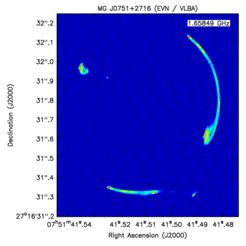Simona Vegetti now head of Lise Meitner Excellence Group
The Max Planck Society has appointed Simona Vegetti at MPA to head a Lise Meitner Excellence Group. Simona Vegetti will use strong gravitational lensing observations to measure the abundance and structural properties of dark matter haloes and thereby provide clean observational constraints on the nature of dark matter. As part of the programme, the group is endowed with an internationally competitive budget for material and human resources.
Free scientific development, long-term professional security and clear career perspectives – these are the pillars of the Lise Meitner Excellence Program launched by the Max Planck Society in 2018. The program is named after Lise Meitner (1878-1968), an internationally outstanding physicist. After a personal meeting with Max Planck, Lise Meitner was not only given permission to attend his lectures; in 1912 she even became Planck’s assistant. She later became head of her own department at the nearby Kaiser Wilhelm Institute for Chemistry, lectured as a professor at the University of Berlin and was even nominated for the Nobel Prize in 1924 and 1925 for her work on the new element protactinium together with her research partner Otto Hahn. However, after the war, the Nobel Prize committee overlooked Meitner’s contribution when it awarded the Prize solely to Otto Hahn in 1945. Only in recent times has there been greater recognition of her contribution to the discovery of nuclear fission and her role as a pioneer in radiation physics. Awarding a Lise Meitner research group to Simona Vegetti, the MPG recognises her as one of the “rising stars” among young female scientists.

Simona Vegetti pioneered a new approach to the dark matter problem with gravitational lensing, continually developing state-of-the-art lens modelling codes. She has gained a world-leading position in the area of (sub)structure lensing, which she uses to measure the abundance and structural properties of dark matter haloes. Moreover, she will measure the physical properties of high-redshift lensed galaxies to study star formation and feedback processes at cosmologically-interesting epochs on sub-kpc scales. The group uses strong gravitational lensing data to provide robust observational constraints on the nature of dark matter and the processes that govern galaxy evolution. To achieve this, they develop novel numerical techniques to extract reliable information from large samples of observations, and test current theoretical models.
In the next 5–10 years, Simona Vegetti aims to take advantage of the high-resolution and large volume data to be provided by upcoming surveys with instruments such as Euclid and the SKA to gain a deeper understanding of dark matter and cosmic structure formation. This program will provide a critical test of the current standard structure formation paradigm with potentially far-reaching implications for the fields of galaxy formation and cosmology. In addition, her group aims to gain new insights also about galaxy formation using the lensing effect of both individual galaxies and galaxy clusters. The strong lensing observations will be used to learn about the properties and evolution of magnetic fields in distant galaxies and their influence on the properties of the galaxies themselves as well as the detailed properties of high-redshift galaxies in general.
For the past four years, Simona Vegetti held a Max Planck Research Group Leader position at the MPA, and in 2017 she was awarded an ERC starting grant to measure the low-mass end of the halo mass function and provide a clean test of the cold dark matter paradigm. Before coming to MPA, she was a Pappalardo Postdoctoral Fellow at the MIT Kavli Institute, MA, USA, after obtaining her PhD from the Groningen University, Netherlands in 2010.








